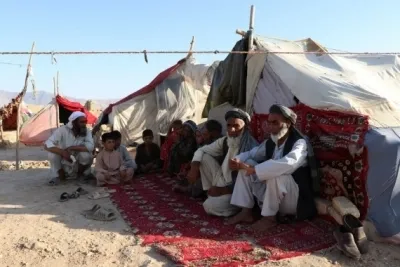Why Are Residents of Kabul Worried About the Rising Prices of Firewood and Coal?

Synopsis
Key Takeaways
- Kabul residents face soaring prices of heating materials.
- Firewood costs have risen to 12,000 Afghanis per cart.
- Unemployment exacerbates the affordability crisis.
- Vendors cite transportation and fuel costs as reasons for price hikes.
- Immediate government action is urged to alleviate financial burdens.
Kabul, Oct 23 (NationPress) As the winter season approaches, many residents of Kabul have expressed their worries over the escalating costs of firewood and coal in the local markets, according to reports from local media on Thursday.
They noted that even though the weather remains relatively mild, the prices of coal and firewood have surged, creating hardships for low-income families, as highlighted by Afghanistan's prominent media source, Tolo News. The citizens of Kabul indicated that the rising costs have made it difficult for them to purchase these essential heating materials.
“Firewood and coal have become prohibitively pricey, making them unaffordable for many. With a high unemployment rate, we urge the government to address this pressing issue and the soaring prices,” voiced a local resident, Abdul Kareem, as reported by Tolo News.
“Currently, a cart of firewood is priced at 12,000 Afghanis, and winter hasn’t even set in yet. A sack of coal now ranges from 1,700 to 1,800 Afghanis. We implore the government to bring down these prices,” added another resident, Mohammed Saber.
On the other hand, local firewood and coal vendors in Kabul have confirmed the price hikes and attributed them to rising transportation costs, taxes, and fuel prices.
Nazirullah, a firewood seller, remarked on the increased prices of mulberry, walnut wood, and firewood. He indicated, “A cart of firewood from Khost and Paktia now costs 12,500 Afghanis. Mulberry and walnut wood are priced between 7,500 and 8,000 Afghanis per cart. Compared to last month, the price of oak wood has surged by about 1,500 Afghanis.”
According to coal seller Raqib, the cost of coal sourced from Dara-e-Suf used to be between 9,400-9,500 Afghanis, but has now escalated to 11,700 or even 11,800 Afghanis.
Ajmal Wahidi, head of the Kabul Timber Sellers’ Union, stated that if the government permits the import of Kunar wood, prices could drop to approximately 8,000 Afghanis. However, he emphasized the need for a swift decision on imports, or prices may rise to 13,000 or 14,000 Afghanis.










